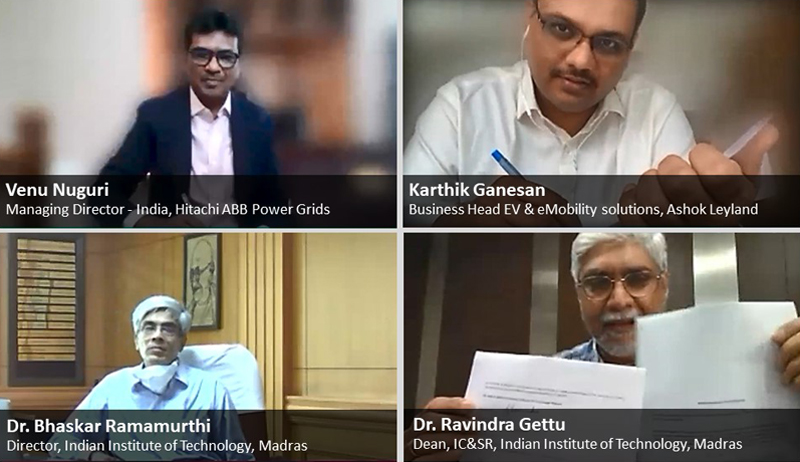The tripartite MoU is for an e-mobility social innovation pilot and will help accelerate India’s journey toward a carbon-neutral energy future and sustainable society
Hitachi ABB Power Grids in India has announced the signing of a Memorandum of Understanding with Ashok Leyland and the Indian Institute of Technology Madras (IITM) for an e-mobility pilot. The triumvirate will run an electric bus (e-bus) pilot to support sustainable in-campus commuting by IITM’s students and staff. The e-bus, which will incorporate Hitachi ABB Power Grids’ innovative flash-charging technology – Grid-eMotion™ Flash, will be provided by India’s largest bus manufacturer, Ashok Leyland.

IITM will host the infrastructure required to operate the flash-charging system for the e-bus. “We need to have all hands-on deck – industry, academia and policymakers to develop a strong and reliable local ecosystem to support the Indian electric vehicle (EV) revolution,” said N. Venu, Managing Director, Hitachi ABB Power Grids in India. “With sound policy levers in place, this partnership – engaging some of the finest industry and academic minds in India – creates a truly sustainable framework for e-mobility. We are delighted to be partnering with Ashok Leyland and IITM to provide a zero-emission mass public transportation bus system through our award-winning technology, localised for the Indian market,” he added.
“As pioneers in the bus segment we are proud to partner on yet another innovative solution in the e-bus segment. A combination of our robust buses with electric propulsion technology and flash-charging from Hitachi ABB Power Grids can be the answer to the need for sustainable public transportation across the country,” said Dr. N. Saravanan, Chief Technology Officer, Ashok Leyland. “This latest alliance will further help us stay at the forefront of embedding innovative and indigenous technologies to nurture the smart e-mobility ecosystem in India,” he added.
“The development of India’s e-mobility charging infrastructure and increased deployment of e-buses is key to meeting the demand for sustainable transport solutions across India’s rural and urban areas. We hope to study and understand how the right technology can enable an efficient transport system without damaging the environment. We are delighted to have partnered with the best in the industry for this endeavour,” said Prof. Bhaskar Ramamurthi, Director, IIT Madras.
Smart e-mobility is at a nascent stage in India. While India’s Government is striving to scale up EV adoption to 30% by 2030, the mass public transport segment is largely untouched. For bus operators, the switch to electric has previously presented challenges. That is because with battery-operated buses it is difficult to maximise passenger load-carrying capacity and running time while making the whole operation economically viable. An e-bus with flash-charging technology can solve that problem while improving the quality of life through reducing pollution in densely populated urban areas.
Hitachi ABB Power Grids’ innovative flash-charging system quickly tops up the battery while passengers get on and off the bus. On arterial roads, an e-bus with this solution can reduce the need to take the vehicle out of service for recharging every few hours or having a replacement bus ready. This helps minimise the size of the fleet while increasing passenger carrying capacity. The technology can save as much as 1,000 tons of carbon dioxide on a line covering 6,00,000 km per year and offer operating cost-savings of 30% versus an equivalent diesel transit system. This brings business value to operators while enabling a low-carbon society.